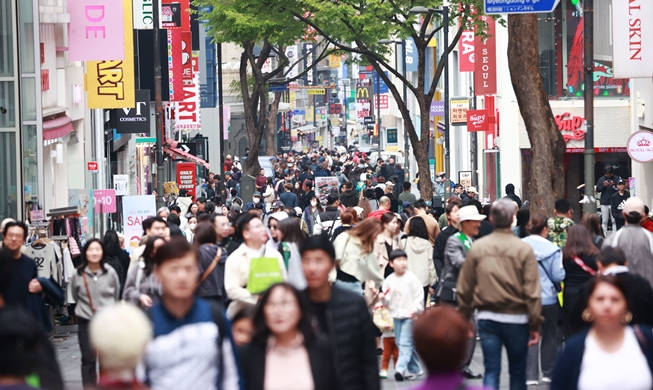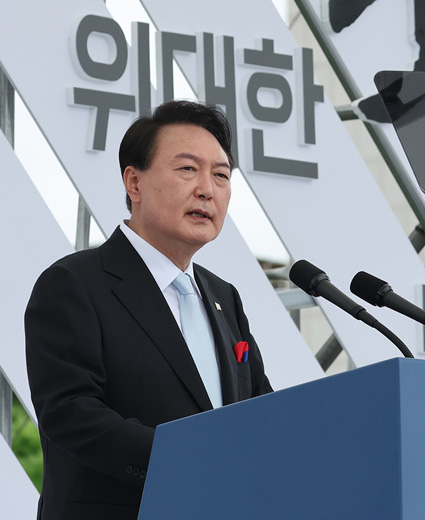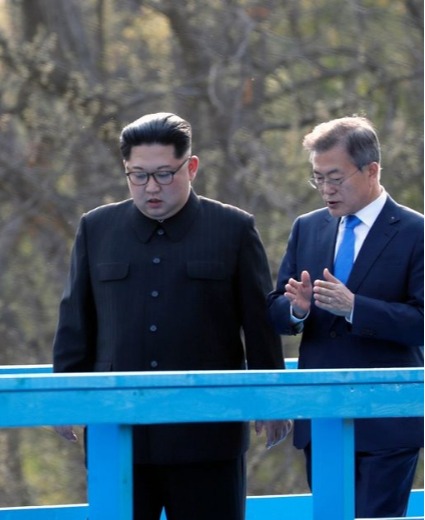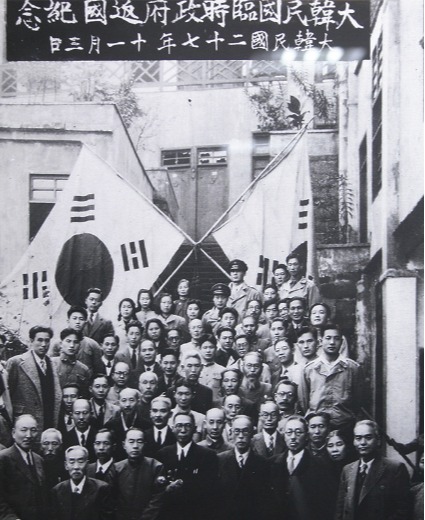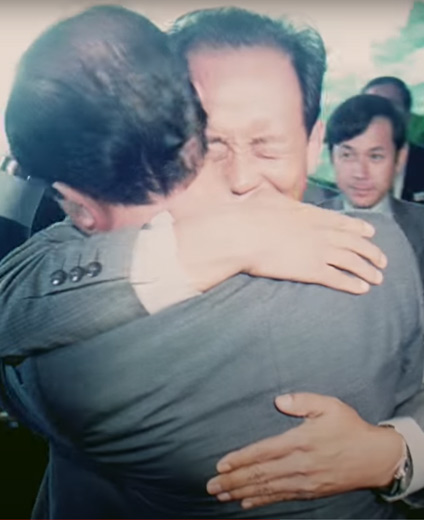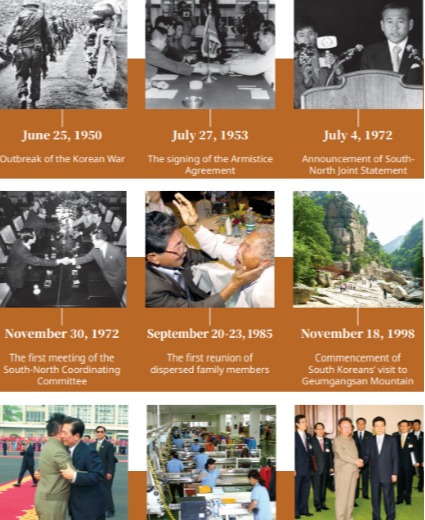-
 Korea.net's 24-hour YouTube channel
Korea.net's 24-hour YouTube channel- NEWS FOCUS
- ABOUT KOREA
- EVENTS
- RESOURCES
- GOVERNMENT
- ABOUT US
South Korea has ceaselessly made efforts to relieve tensions on the Korean Peninsula and open up a new path toward peace. As a result, the inter-Korean summit that took place in 2018 for the first time in 11 years since 2007 laid the foundation for the groundbreaking improvement in inter-Korean relations and the advancement of permanent peace on the Korean Peninsula.
On April 27, 2018, Chairman of the State Affairs Commission Kim Jong Un crossed the border into South Korea for an inter-Korean summit held at the Peace House on the southern side of the border village of Panmunjeom, becoming the first North Korean leader to set foot on South Korean soil. During the historic summit, President Moon Jae-in and Chairman Kim Jong Un agreed to facilitate groundbreaking advancements in inter-Korean relations, and to establish a permanent and solid peace regime on the Korean Peninsula by signing the Panmunjeom Declaration for Peace, Prosperity and Unification of the Korean Peninsula.
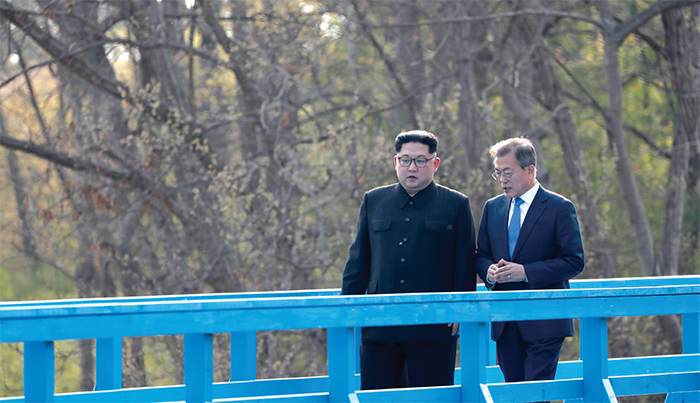
The major agreements made in the Panmunjeom Declaration are as follows:
The two sides agreed to establish a permanent and peaceful Korean peninsula peace regime through complete denuclearization; to continue high-level workinglevel talks for bringing an end to the current unnatural state of armistice and establishing a firm peace regime on the Korean Peninsula in 2018; to frequently have an in-depth discussion through regular meetings and hotlines, along with the visit of President Moon Jae-in to Pyongyang in fall of 2018; to establish a joint liaison office with resident representatives of both sides in the Gaeseong area; to stop all hostile acts and further transform the DMZ into a peace zone; to hold the reunion of separated families and relatives with the upcoming August 15 as an occasion and invigorate multi-faceted cooperation, exchanges, visits and contacts of people from all levels of society; and to relink and modernize railways and roads on the eastern and western coasts.
North Korea’s additional pledges to dismantle its Punggye-ri Nuclear Test Site in public view and to change its time zone to match that of South Korea were implemented in May 2018.
The most crucial part of the Panmunjeom Declaration, which was North Korea’s strong will to denuclearize, immediately drew massive global media attention. CNN said, “The two Koreas will bring a formal end to the Korean War, ceasing 64 years of hostilities,” while CCTV commented, “South Korea and North Korea eased military tension and paved the way for complete denuclearization on the Korean Peninsula.”
On May 26, 2018, the South Korean and North Korean leaders met again at Tongilgak on the northern side of Panmunjeom. Their second summit called for cooperative efforts to implement the Panmunjeom Declaration and to successfully hold the planned North Korea-US summit. The two leaders also reaffirmed their commitment to meet at any time and in any place if the need arose.
On September 18, 2018, the third inter-Korean summit was held in Pyongyang, North Korea. The leaders of the two Koreas signed the Pyongyang Joint Declaration of September 2018 before announcing it at a joint press conference on that day. This declaration includes measures to expand the cessation of military hostilities including substantially lowering the danger of war on the Korean Peninsula, in addition to inter-Korean economic cooperation such as the connection of railways and roads along the east and west coasts.
The 2018 Inter-Korean Summit was a watershed moment for denuclearization and peace on the Korean Peninsula as well as the advancement of inter-Korean relations. Their severed ties have been reconnected, and Panmunjeom, which had been a symbol of division, has become a symbol of peace.
In addition, the successful inter-Korean summit laid the groundwork for the first North Korea-US summit held in Singapore on June 12, 2018. The back-to-back summit between the leaders of the two Koreas led to the first, historic summit between President Donald J. Trump of the United States and Chairman Kim Jong Un of North Korea held in Singapore on June 12, 2018, which became milestones toward the peaceful resolution of North Korean nuclear issues and peace on the Korean Peninsula, a goal fully shared by the international community. The second North Korea-U.S. summit was held in Hanoi, Vietnam on February 27, 2019.
President Moon Jae-in’s Policy on the Korean Peninsula
President Moon Jae-in’s policy on the Korean Peninsula was a long-term and comprehensive policy led by South Korea and North Korea to realize peace and prosperity on the Korean Peninsula, with the involvement of neighboring Northeast Asian countries together with international society. The three goals of the policy were: to uphold peace with the highest priority; to pursue a Korean Peninsula of co-prosperity based on the spirit of mutual respect; to establish sustainable inter-Korean relations; and to build a new economic order that will bring peace and prosperity to the Korean Peninsula and Northeast Asia.
On April 27, 2018, Chairman of the State Affairs Commission Kim Jong Un crossed the border into South Korea for an inter-Korean summit held at the Peace House on the southern side of the border village of Panmunjeom, becoming the first North Korean leader to set foot on South Korean soil. During the historic summit, President Moon Jae-in and Chairman Kim Jong Un agreed to facilitate groundbreaking advancements in inter-Korean relations, and to establish a permanent and solid peace regime on the Korean Peninsula by signing the Panmunjeom Declaration for Peace, Prosperity and Unification of the Korean Peninsula.

President Moon Jae-in and Chairman Kim Jong Un take a stroll on the footbridge at the inter-Korean border village of Panmunjeom.
The major agreements made in the Panmunjeom Declaration are as follows:
The two sides agreed to establish a permanent and peaceful Korean peninsula peace regime through complete denuclearization; to continue high-level workinglevel talks for bringing an end to the current unnatural state of armistice and establishing a firm peace regime on the Korean Peninsula in 2018; to frequently have an in-depth discussion through regular meetings and hotlines, along with the visit of President Moon Jae-in to Pyongyang in fall of 2018; to establish a joint liaison office with resident representatives of both sides in the Gaeseong area; to stop all hostile acts and further transform the DMZ into a peace zone; to hold the reunion of separated families and relatives with the upcoming August 15 as an occasion and invigorate multi-faceted cooperation, exchanges, visits and contacts of people from all levels of society; and to relink and modernize railways and roads on the eastern and western coasts.
North Korea’s additional pledges to dismantle its Punggye-ri Nuclear Test Site in public view and to change its time zone to match that of South Korea were implemented in May 2018.
The most crucial part of the Panmunjeom Declaration, which was North Korea’s strong will to denuclearize, immediately drew massive global media attention. CNN said, “The two Koreas will bring a formal end to the Korean War, ceasing 64 years of hostilities,” while CCTV commented, “South Korea and North Korea eased military tension and paved the way for complete denuclearization on the Korean Peninsula.”
On May 26, 2018, the South Korean and North Korean leaders met again at Tongilgak on the northern side of Panmunjeom. Their second summit called for cooperative efforts to implement the Panmunjeom Declaration and to successfully hold the planned North Korea-US summit. The two leaders also reaffirmed their commitment to meet at any time and in any place if the need arose.
On September 18, 2018, the third inter-Korean summit was held in Pyongyang, North Korea. The leaders of the two Koreas signed the Pyongyang Joint Declaration of September 2018 before announcing it at a joint press conference on that day. This declaration includes measures to expand the cessation of military hostilities including substantially lowering the danger of war on the Korean Peninsula, in addition to inter-Korean economic cooperation such as the connection of railways and roads along the east and west coasts.
The 2018 Inter-Korean Summit was a watershed moment for denuclearization and peace on the Korean Peninsula as well as the advancement of inter-Korean relations. Their severed ties have been reconnected, and Panmunjeom, which had been a symbol of division, has become a symbol of peace.
In addition, the successful inter-Korean summit laid the groundwork for the first North Korea-US summit held in Singapore on June 12, 2018. The back-to-back summit between the leaders of the two Koreas led to the first, historic summit between President Donald J. Trump of the United States and Chairman Kim Jong Un of North Korea held in Singapore on June 12, 2018, which became milestones toward the peaceful resolution of North Korean nuclear issues and peace on the Korean Peninsula, a goal fully shared by the international community. The second North Korea-U.S. summit was held in Hanoi, Vietnam on February 27, 2019.
President Moon Jae-in’s Policy on the Korean Peninsula
President Moon Jae-in’s policy on the Korean Peninsula was a long-term and comprehensive policy led by South Korea and North Korea to realize peace and prosperity on the Korean Peninsula, with the involvement of neighboring Northeast Asian countries together with international society. The three goals of the policy were: to uphold peace with the highest priority; to pursue a Korean Peninsula of co-prosperity based on the spirit of mutual respect; to establish sustainable inter-Korean relations; and to build a new economic order that will bring peace and prosperity to the Korean Peninsula and Northeast Asia.




